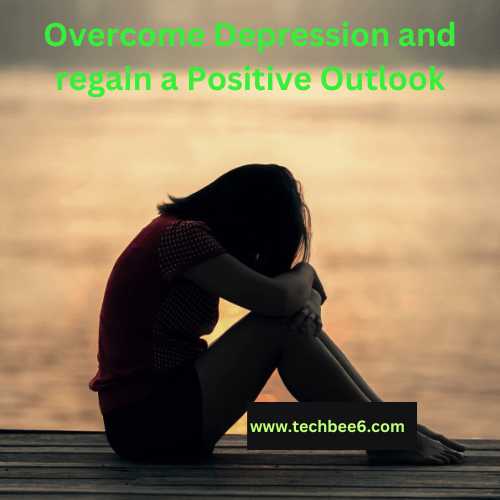Everyone goes through “ups” and “downs” in life. But when the “downs” outweigh the “ups” for more than a few weeks, causing problems with everyday activities such as eating, sleeping, working and getting along with friends, Depression may be the reason. Depression affects a person’s physical health, as well as how they feel, think and act toward others. It brings about a mixture of feelings and thoughts that can cause someone to depart from his or her usual behaviour. Depression is very common. In order to avoid it and Overcome Depression and regain a positive outlook this article will help you.
Google says about Depression says, clinical Depression is a medical condition where a person feels very low or sad over a long period of time. It is more severe than the general feeling of hopelessness that a person may feel after a particularly stressful event in her life and often results in a change in person’s functioning. During bouts of Depression, a person feels extremely rejected and has feelings of inadequacy or low self-esteem. They take a gloomy outlook upon life.
Symptoms of Un-happiness/Depression:
The Symotoms of Depression may differ from one person to another and vary one time. Some people have only a few symptoms, while others may have symptoms at once. But in general, people with Depression may experience one or more.

Depression is an illness that involves the body, mood and thoughts. It affects the way a person eats and sleeps, they way one feels about oneself, and the way one thinks about things. Depression is not the same as a passing “blue” mood. Without treatment, symptoms can last for weeks, months or years. Symptoms of Depression include:
- Trouble concentrating.
- Lack of Motivation.
- Crying, feeling of sadness.
- Constant worry.
- Sleep disturbance, either excessive sleep or insomnia (Lack of sleep)
- Continuous fatigue and tierdness.
- Headache.
- Feeling of irritability and excessive crying.
- Loss of appetite.
- Vague pains in the body.
- Fluctuation in weight.
- Loss of interest in any activity.
- Constipation.
- Decrease in sexual urge.
- Poor Concentration.
- Poor coordination of limbs.
- Feelin of worthlessness, Helplessness and guilt.
What Causes Sadness/Depression:
A person may experience symptoms of Depression suddenly, for no apparent reason, or after a life-changing event or medical illness. Research shows that if a family member has depression, the likelihood of other members experiencing it increases, highlighting the role of genetics alongside environmental factors in its development.
Read More: Happy Life with the power of positive thinking
While the exact causes of depression remain unclear, one leading theory is that it may be linked to a chemical imbalance in the brain. This imbalance often involves neurotransmitters such as serotonin, norepinephrine, and dopamine, which play key roles in mood regulation. Factors such as genetics, environment, and life stressors can also contribute to these imbalances, influencing an individual’s risk of developing depression
It is now believed that Depression is caused by a combination of genetic factors and exposure to a stressful life event. In other words, the chance of a person having the condition increases considerably if one or more family members has it. This increased susceptibility may be linked to hormonal fluctuations, social factors, and stressors unique to that stage of life. There are many causes for clinical depression.
- Depression can be inherited, meaning that a person’s risk of developing the condition significantly increases if one or more family members have it. This suggests a genetic component that contributes to vulnerability, alongside environmental and psychological factors.
- Physical illness like cancer and heart disease may be followed by depression.
- Some blood pressure medications may affect neurotransmitter levels or brain chemistry, leading to symptoms of depression in some individuals. It’s important for patients to discuss any mood changes with their healthcare provider, as adjustments to medication may be necessary.
- Certain personality traits can increase susceptibility to depression. Individuals who tend to have a negative self-image, view themselves as “losers,” or maintain a pessimistic outlook may be more prone to depressive symptoms. These negative thought patterns can influence how they cope with stress and adversity, making them vulnerable to developing depression.
How to overcome and regain a positive outlook from a Depression state:
- Be aware of the cause of your depression and try to be optimistic about the future.
- Focus on your positive experiences.
-
- Get socially active.
- Find a hobby or two.
- Exercise daily.
- Use self-relaxation techniques whenever you feel tensed.
- Set realistic goals.
- Try to know and develop your strengths.
- Get professional help if symptoms of depression persist. Read more: Ten Commandments for managing stress
How to help a Depressed person to overcome:
- Do not tell Depressed person that you know what he/she is feeling.
- Be supportive and patient.
- Let the person know that you are concerned and that you will be there for him/her.
- Encourage the person to seek professional help if symptoms are persistent and seem to interfere with activities for daily living.



